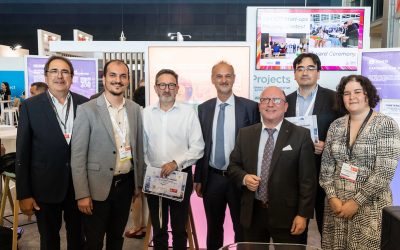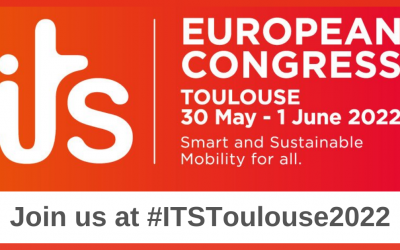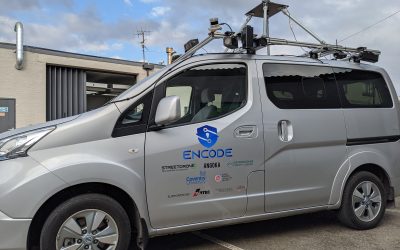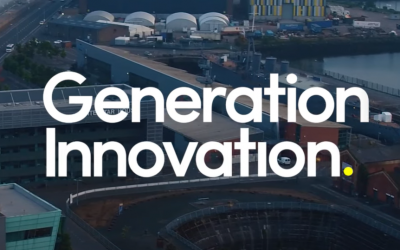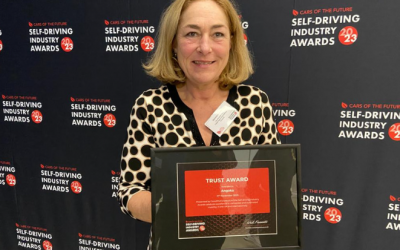October 7, 2021

By Jay Nagley, Head of Business Development, Land Mobility & Northern Ireland at ANGOKA. This article was originally published in TaaS Magazine’s Issue XII 2021.
2020 was meant to be the year when autonomous vehicles were to hit the road in serious numbers. In 2017 one analyst talked of a “conservative estimate” of 10 million autonomous cars by now – about 10 million more than are in circulation a year after the deadline. With the inevitable exception of Elon Musk, every car company has dialled back the predictions of autonomous vehicles it made in 2016/2017.
Meanwhile, a lot of money has been quietly flowing into the unglamorous end of vehicle automation: Level 2 autonomy. Five years ago, Level 2 automation (combined driver assistance features like adaptive cruise control and lane keep assist) was seen as little more than a road-sign on the journey to full Level 5 autonomy. However, the cost and complexity of a vehicle having to make all the driving decisions has turned out to be far more difficult than envisaged a few years ago.
Speaking to Spectrum magazine, Gill Pratt, CEO of the Toyota Research Institute in California, said that rapid advances in the first stage of vehicle automation (image recognition) made researchers think that the next stage (prediction and decision making) would advance equally quickly. In fact, there is little evidence that these areas have advanced significantly in the last five years.
A recent demonstration of UK company Five AI’s Level 4 Ford Mondeo in South London provided a good snapshot of the current state-of-the-art developments. It was hugely impressive dealing with situations it had learned to handle, taking a perfect line through one junction that would have impressed Lewis Hamilton. However, predicting what other drivers were about to do was more difficult: one approaching driver that slowed down for a roundabout made the Mondeo think it should proceed, but when the other driver accelerated slightly, the autonomous Mondeo did an emergency stop. This demonstrated the inevitable overreaction of a system that is rightly programmed not to have full confidence in its own decisions.
Instead of chasing the rainbow of Level 5 autonomy, the global Tier Ones like Bosch and ZF (the companies who actually develop most electronic technology in the car industry) are now concentrating on two areas for on-road automation: Level 2 Plus for the entire industry, and Level 3 for premium models.
Level 2 Plus is a relatively recent concept, which is about stretching Level 2 systems as far as they can go, while still leaving ultimate control with the driver. German giant ZF has probably done most to popularise the concept, which tries to provide assistance for almost every manoeuvre a driver makes, even including “merge assist” for motorway slip-roads. The company says it can provide a complete system to an OEM for well under $1000 – a fraction of what an autonomous system would cost.
Level 3, which was originally framed to mean conditional automation, where the car could drive itself, but would hand back to the driver if it encountered a situation it could not cope with, has been subtly redefined. Today, it effectively means automated driving on a highway at relatively low speeds (up to 50 km/h). The reason for restricting it to highways is that a Level 3 system would need to stay in control for the 5-10 seconds a driver needs to resume command – so it can only operate where the possible challenges during that time are limited.
So, does the march of driver assist systems mean the marginalisation of autonomy? Not necessarily, but it means full autonomy will only to be used in specific use cases for the next 5-10 years. The first application is likely to be logistics – so-called ZEAL (Zero Emissions Automated Logistics). Vehicles that operate in bounded environments (e.g. ports or logistics hubs) are far easier to automate, as their entire operational domain can be mapped, and interactions with other vehicles can be controlled.
Currently, most of these autonomous vehicles are actually teleoperated, with a controller overseeing their activities. This hugely reduces cost and complexity, as the “brain of last resort” is a human one, which has had millions of years of free training in handling unexpected situations, as opposed to a hugely expensive computer whose evolution has to be paid for.
However, this does raise another issue. Automated logistics vehicles need to be in constant contact with both their operator and with each other. The communications themselves are well understood, and constantly improving (5G being the most important advance), but the greater volume of communications creates major opportunities for hacking. Quite often the cybersecurity aspects of trials or deployments are left until the last minute – the boring stuff that nobody wants to take charge of. It is also expensive, as operators must not only set up the security system but also to keep it regularly updated with fresh cryptographic keys and Certificates to refresh the system and communications security.
This is the issue that Angoka has addressed with its hardware-based cybersecurity solution, using Device Authentication Units (DAUs) to handle the identity generation and management of the device, as well as its authentication and authorisation. As it is based on hardware, it is intrinsically safer than relying on software alone. It is also more cost-effective as the DAUs collaboratively create passwords in real-time, removing the need to periodically load new passwords to maintain security. Finally, it is widely applicable, because it provides trusted communications in an untrusted network.
When the vehicle is started, each device contributes to the creation of a new session key – a unique password shared between authorised devices on the network. Effectively it is like providing a police escort to a prison van to ensure that the van arrives securely at its destination (unless it is an episode of Line of Duty, of course).
This solution is already being used in ZEAL trials. It won’t magically solve the problems of delivering Level 5 autonomous vehicles in the 2030s, but it does simplify the issues around implementing Level 4 logistics solutions in the 2020s.
Related Articles
ANGOKA NAMED TOP START-UP AT 2022 ITS EUROPEAN CONGRESS
At this week’s ITS European Congress in Toulouse, ANGOKA became a multi-award winning start-up, having successfully pitched and won two awards as part of the show’s highly competitive start-up pitching competition. Hosted by ERTICO, the ITS European Congress is a...
ANGOKA Shortlisted for Ireland Final of KPMG Global Tech Innovator 2022 Prize
We're thrilled to announce that ANGOKA has made it to the all-Ireland finals of the prestigious 2022 KPMG Global Tech Innovator awards. ANGOKA were shortlisted in recognition of our pioneering technology which integrates identity management and secure data...
Global Security and Innovation: ANGOKA’s Non-Executive Director speaks at the Secure Connected Intelligence Summit
ANGOKA's senior team recently joined international leaders from academia, government and business at the Secure Connected Intelligence Summit. Hosted by Queen's University Belfast's specialist centre for Electronics, Communications and Information Technology (ECIT),...
ANGOKA to exhibit at ITS European Congress 2022
ANGOKA are preparing to exhibit at this year’s ITS European Congress, joining the global ITS community at Europe’s biggest show for mobility solutions. Now in its fourteenth year, the ITS European Congress is a landmark event attended by influential figures,...
ANGOKA’s innovation highly commended at Digital DNA Awards
ANGOKA's innovation and growth was highly commended at last night's Digital DNA Awards 2022 as we were named runner-up in the Digital Innovation Project of the Year award category. The Digital Innovation Project of the Year award recognises teams who have delivered...
ANGOKA selected for inaugural Software République startup incubator
ANGOKA has recently been selected for Software République's startup incubator programme, a project that unites leading companies with innovative startups to accelerate sustainable, secure, and intelligent mobility solutions. As one of five startups selected for the...
ANGOKA technology safeguards driverless vehicles at live logistics showcase in London and Oxford
BELFAST, UK, March 29 – ANGOKA Ltd. has celebrated the successful deployment of two cybersecure, teleoperated vehicles on open roads in collaboration with its ENCODE partners at a live showcase event in London and Oxford. The twin event marks a historic turning point...
ANGOKA Participates in Catalyst’s Generation Innovation Impact Day
As Belfast is the home of our HQ, we are passionate about giving back to the community and thrilled to join other NI tech companies in the Catalyst Generation Innovation Programme, presenting the excitement of the tech sector to the next generation of innovators. Last...
ANGOKA appoints Director of Security Products
Belfast-based cybersecurity expert ANGOKA has expanded its team as Robert McCausland joins as Director of Security Products. With extensive experience spanning engineering and technical leadership, Robert has spent the last 16 years designing and delivering Identity...
ANGOKA Wins Self-Driving Industrys Trust Award
We are delighted to have been awarded in the 'Trust' category at the 'Self-driving Industry' Awards in Margate last week. Hosted by Cars Of The Future, the awards recognise the most compelling innovators in the Connected Autonomous Mobility ecosystem. Our Chief...
ANGOKA TO REVEAL NEXT GENERATION SECURITY TO PROTECT “LAST MILE” COMMUNICATIONS
Belfast-based cyber security leader ANGOKA is to unveil a new solution which offers robust security in the face of emerging quantum threats about to confront our daily lives. The new technology provides quantum-secure last mile key exchange (the security of data...

